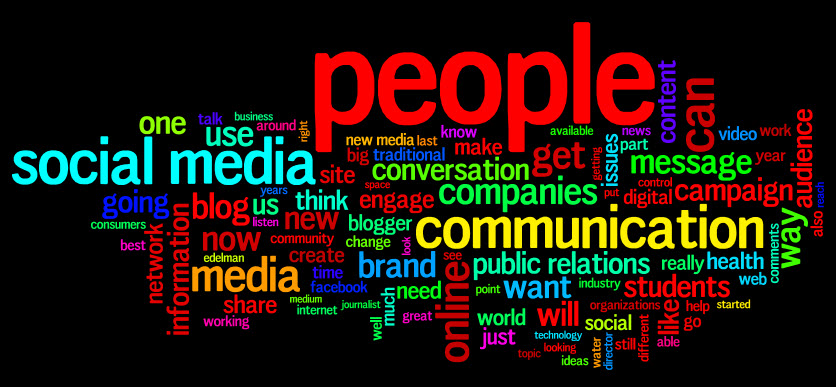Regardless what company you are working with or which newspaper outlets you are sending a news release to, there are a baker’s dozen items that should appear in most news releases.
Regardless what company you are working with or which newspaper outlets you are sending a news release to, there are a baker’s dozen items that should appear in most news releases.

Edelman and PR Week hosted the New Media Academic Summit 08 last month in Chicago. It was a fantastic opportunity for public relations educators from around North America to learn how new media is being applied and measured in companies around the globe. Below are some of my favorite soundbites from the Summit. For an almost-complete transcript of the dozen or so sessions, visit Edelman’s site where the sessions were live-blogged. Edelman has also posted video of all of the sessions.
Richard Edelman, President & CEO, Edelman
Weeklies (weekly newspapers) are in terminal decline.
Obama has surround sound; he is everywhere.
Google never forgets.
Conversational crack [view complete presentation]
Julia Hood, Publishing Director, PR Week
Pitching is broken art in public relations. [view complete presentation]
Alexandra Wheeler, Director of Digital Strategy, Starbucks
It’s not just launch and abandon; it’s also care and feeding.
Anyone with a keyboard has a voice. [view complete presentation]
Jim Kirk, Associate Managing Editor of Financial News, Chicago Tribune
The newspaper industry was in a recession before the recession. [view complete presentation]
Troy Mastin, Media Analyst, William Blair & Co.
You rule out a large portion of your potential audience if you force them to pay for content.
Most people will probably participate in a maximum of three social networks, one personal, one professional and one for their passion. [view complete presentation]
Neville Hobson, Blogger & Co-Host of For Immediate Release podcast
There is an educational need for the older audience in public relations because of the way we now share messages and information; the older generation helps the younger generation learn how the corporations work and communicate, and the younger generation helps with the new way their generation shares ideas and news. [view complete presentation]
Wolfgang Luenenbuerger, Director Europe, Edelman
The Internet is not yet 5000 days old and yet it’s this complex. [view complete presentation]
Marshall Manson, Director of Digital Strategy, Edelman
[There’s] a tension between language and geography in Europe. [view complete presentation]
Mindy Finn, Director of Finn Enterprises
Buzz is nice, but don’t do something for buzz only. [view complete presentation]
Mike Krempansky, Senior Vice President, Online Advocacy, Edelman
It’s happening whether you drive it or not. [view complete presentation]
Mark Monseau, Director of Corporate Communications, Johnson & Johnson
You don’t create communities; communities create themselves. [view complete presentation]
David Rubin, Brand Building Director, Unilever
We sell bottles of shampoo not entertainment.
No one really wants to visit a deodorant website.
The newer the new media gets, the more important it is to get back to communication fundamentals. [view complete presentation]
Marcel LeBrun, CEO, Radian6
The social medium is the message. [view complete presentation]
Charlene Li, co-author of Groundswell
Listening, talking, energizing, supporting and embracing [view complete presentation]
Rick Murray, President, Edelman
Look to others for innovation; look to yourself for innovation in process.
(Regarding current college students) Social media is part of their work and part of their world. [view complete presentation]

At a Poynter Institute seminar kickoff today, about a dozen faculty members from Statesboro to San Luis Obispo and from Miami Beach to Toronto gathered to discuss “Teaching Diversity Across the Curriculum.” In Poynter’s words, “If tomorrow’s journalists are to report and write about a dynamic, increasingly diverse society, they’ll need guidance in the classroom. Whatever the course, there’s a place for teaching diversity — issues of race, ethnicity and gender — across the journalism curriculum.”
What do journalists stand for? Here are many of the ideas we brainstormed, in no particular order:
- Truth, justice & the American way
- Accuracy
- Ethics
- Fairness
- Completeness, over the long haul
- Honesty
- Self-awareness
- Integrity
- Mensch (a Yiddish term)
- Currency (being current)
- Relevance
- Accountability
- Power (as journalists, we have it and must use it wisely)
- Power of storytelling
- Understanding (by the journalist, of the people and their issues)
- Balance
- Principles
- Love of storytelling
- Love of writing
- Love of reading
- Transparency
- Empathy
Do you know an excellent story when you read one? What makes a story excellent? Here are some of our thoughts. Again, these are in no particular order:
- Transports you
- Universality
- Passion
- Rich characters that you care about (even if you don’t like them)
- It’s about people
- Tension à resolution
- Something new
- Gripping, through use of quotations and anecdotes
- Great words
- Anticipation
- Balance
- Visuals through wordcrafting
- Opens new vistas for us
- Structure
- Seamless scene setting
- Sense of time and place
- Compelling
- Imaginative / creative
- Permanence
- Discipline
Seminar leader Lillian Dunlap shared a formula with us, which I’ve graphically represented below.
Stay tuned for more as this weeklong seminar progresses.